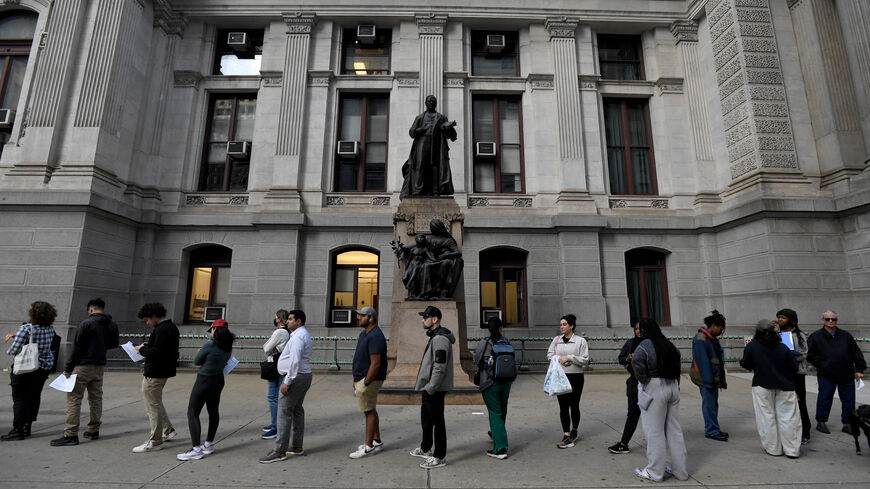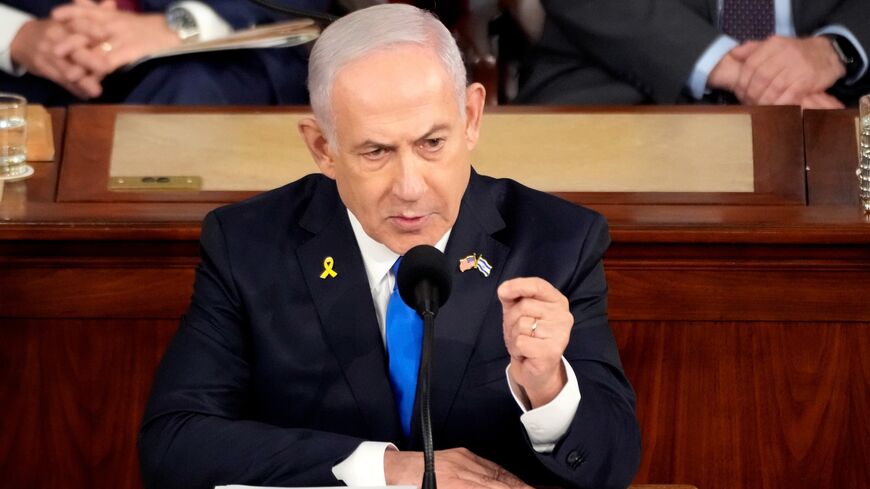Kamala Harris tells Netanyahu 'time to get deal done,' highlights Palestinian suffering
The meeting today encapsulates the challenges the vice president faces in maintaining a fragile Democratic coalition divided over Israel's war in Gaza.

WASHINGTON — After US Vice President Kamala Harris met with Israeli Prime Minister Benjamin Netyanhu at the White House on Thursday, she called for a “permanent end” to hostilities in Gaza, and she told the Israeli premier that “it is time to get this deal done,” urging him to accept an agreement with Hamas for a cease-fire in Gaza in exchange for the release of hostages.
“It is time for this war to end and end in a way where Israel is secure, all the hostages are released, the suffering of Palestinians in Gaza ends, and the Palestinian people can exercise their right to freedom, dignity and self-determination,” said Harris.
Harris said she relayed her “serious concerns about the scale of human suffering in Gaza” to Netanyahu, pointing to acute levels of food insecurity as well as “the images of dead children and desperate, hungry people fleeing for safety, sometimes displaced for the second, third or fourth time. We cannot look away in the face of these tragedies. We cannot allow ourselves to become numb to the suffering and will not be silent.”
The meeting was the culmination of her first big election test less than a week after becoming the presumptive Democratic nominee for president. In a matter of days, Harris has had to navigate a tricky electoral minefield embodied by Netanyahu's visit and protests throughout Washington.
While Democrats have largely unified behind Harris this week, the severe humanitarian crisis in Gaza already looms large over her nascent presidential campaign. Her meeting with Netanyahu encapsulated those challenges as she attempts to maintain a fragile Democratic coalition divided over Israel’s nearly 10-month-long Gaza campaign. It has even bled into her selection of a running mate.
Israel PM Netanyahu meets VP Harris pic.twitter.com/Ij62J3TqNn
— Amichai Stein (@AmichaiStein1) July 25, 2024
President Joe Biden’s unfettered military support for Israel’s Gaza offensive under Netanyahu has sparked massive discontent among large swathes of the Democratic base, particularly young voters crucial to the party’s success, with massive pro-Palestine protests sweeping college campuses last spring.
The war has complicated Democrats’ attempts to hold on to the White House, and it remains to be seen whether — and to what extent — Harris will attempt to recalibrate Biden’s Israel policy amid grassroots pressure from the party’s base.
“I think she’s going to express general support for Israel,” Rep. Jerry Nadler, a prominent pro-Israel Jewish Democrat and Netanyahu critic from New York, told MSNBC on Wednesday. “She’s going to be somewhat less supportive than President Biden has been. And I think a large part of the Democratic Party, especially the younger members of the party, want that.”
Nadler was speaking after Netanyahu’s address on Capitol Hill. Harris did not preside over the speech, although the vice president traditionally does so when foreign heads of state address Congress.
She instead attended a campaign event in Indiana that was scheduled before Biden dropped out of the race. Congress firmed up the date for Netanyahu’s address in early June, a few days after Democratic leaders Sen. Chuck Schumer (D-N.Y.) and Rep. Hakeem Jeffries (D-N.Y.) signed on to the Republican-initiated letter formally inviting the prime minister.
Former President Donald Trump’s running mate, Sen. JD Vance (R-Ohio), also skipped Netanyahu’s address to hit the campaign trail.
As senators, both Biden and Harris hewed closely to the American Israel Public Affairs Committee. But some pro-Palestine advocates say they are cautiously optimistic that Harris will take a less hard-line position on the Israeli-Palestinian conflict than Biden did, even if they don’t expect any immediate US policy changes.
“I do not think that what has transpired in the last 10 months could possibly have transpired under any other combination of leaders: Netanyahu on the one side and Biden on the other side,” James Zogby, founder of the Arab American Institute and who previously served on the Democratic National Committee, told Al-Monitor. “I can’t imagine any Democrat that would have allowed this to go on.”
Biden’s staunch support for Israel amid the decimation of Gaza following Hamas’ Oct. 7 killing of Israelis has generated backlash among key components of the Democratic base, including young, Black and Hispanic voters. A campaign to vote “uncommitted” against Biden in the Democratic primary gained significant traction in multiple battleground states.
“Vice President Harris, from very early on, displayed to me in conversation that she had a different view,” said Zogby. “She is the vice president, and vice presidents don’t break with their presidents. But she has said things that no one else in the administration has said and displayed an empathy and understanding that I have not seen from literally anyone else, including the national security adviser and the secretary of state.”
The vice president’s national security adviser, Phil Gordon, visited Israel in June as part of the Biden administration’s push for a cease-fire deal. While there, he publicly highlighted Israel’s growing isolation on the world stage and declining support among the American public.
“Israel is facing growing international criticism and pressure from the United Nations and other international bodies,” said Gordon. “Vocal segments of the American public have spoken out against the war in Gaza. As a result, over the past eight and a half months, the US-Israel partnership has been tested as perhaps never before.”
Harris also called for an “immediate cease-fire” in a March speech while calling on Israel to “open new border crossings.”
“They must not impose any unnecessary restrictions on the delivery of aid,” she said. “They must ensure humanitarian personnel, sites and convoys are not targeted.”
NBC subsequently reported that the National Security Council watered down parts of her speech that contained even harsher language about Israel regarding the humanitarian catastrophe in Gaza.
“We are cautiously optimistic that under a Harris administration she would be more receptive to the needs and concerns of the American people, at least with respect to the war in Gaza,” Yasmine Taeb, the political director of the Muslim American MPower Change advocacy group and a former Democratic National Committee member, told Al-Monitor.
“We’re obviously also cognizant of the fact that she will probably not be inclined to make any sort of drastic policy change prior to November,” said Taeb. “But there’s a variety of ways for her to show that she’s at least listening and receptive to those concerns. One is who she’s going to choose as her running mate.”
Taeb’s organization is urging Harris not to select popular Pennsylvania Governor Josh Shapiro as her running mate. MPower hosted a call with Muslim American leaders earlier this week who were voicing concerns about his role in cracking down on pro-Palestine demonstrators on Pennsylvania campuses last spring.
Shapiro — widely considered a frontrunner to serve as Harris’ running mate — likened the protesters to the Ku Klux Klan in an April interview on CNN. He then called on the University of Pennsylvania in May to bring in police to disperse students protesting against US support for the Gaza war. The dispersal came amid violent police crackdowns on pro-Palestine student protesters across the country.
But Shapiro, who is Jewish, has also called Netanyahu “one of the worst leaders of all time,” accusing him of steering Israel in the “wrong direction.”
Even as Netanyahu lambasted Americans protesting the Gaza war in his speech on Wednesday, thousands of demonstrators gathered beyond Capitol Hill. While the protests remained largely peaceful, a contingent of demonstrators burned American flags and vandalized monuments outside Union Station with graffiti that included phrases like “Hamas is coming.”
The vandalism prompted Harris to issue a statement condemning the “despicable acts of unpatriotic protesters and dangerous, hate-fueled rhetoric” hours before her meeting with Netanyahu.
“I support the right to peacefully protest, but let’s be clear: Antisemitism, hate and violence of any kind have no place in our nation,” said Harris.
It remains to be seen whether Biden and Harris can convince Netanyahu and Hamas to finally end the war. In the meantime, Gaza still looms large over Harris’ surprise presidential campaign, threatening to divide a fragile Democratic coalition that has rapidly coalesced around the vice president in less than a week.
Pro-Palestine protesters are still expected to demonstrate against the war outside of the Democratic National Convention in August. Shortly thereafter, students will return en masse to university campuses in the fall, raising the specter of renewed campus demonstrations in the weeks before election day.






